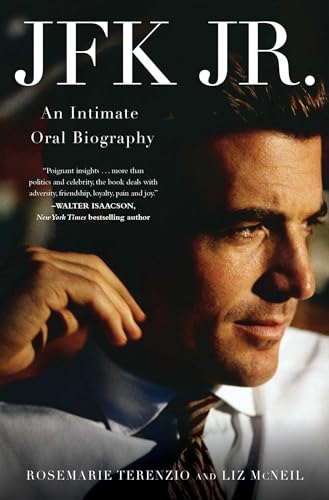Grief shifts. One moment, it’s a happy memory; the next, it’s not. Whether it’s the death of a dear one, a public figure, or even an ideal, humans grieve, and there aren’t obvious, universal, or neat ways to square away dynamic emotions.
Living with deep grief is part of life for author RoseMarie Terenzio, John F. Kennedy Jr.’s executive assistant and chief of staff at George magazine until his death at age 38 when a small plane he piloted crashed off the coast of Martha’s Vineyard in 1999. Wife Carolyn Bessette, 33, and her sister Lauren, 34, also died in the crash.
Terenzio has just written JFK JR., An Intimate Oral Biography with journalist Liz McNeil. The Washington Post calls it the fullest portrait yet of President Kennedy’s only son.
What emerges from hundreds of interviews of family and friends is a patchwork of memories of a famous person and a collection of recollections that might offer a way to consider the tougher parts of grief.
I was curious about how Terenzio managed the task of diving into the echoes and the loss. She took a few minutes to talk about her process, which provides a legacy piece, and why she’s found that grieving with others is lightening her way through the more challenging parts.
“It was interesting reconnecting with those people, some of them who I hadn’t spoken to in 20 or 25 years,” said Terenzio. “It was really important because you have the stories and the memories. Once those go away, the person fades, and you don’t remember, or you don’t have those remembrances.”
Terenzio’s book happens to be about a well-known man, which is why it’s on the best-seller lists. But she offers us valuable insights into why human connections with the living are necessary.
“There is the largeness of John’s life. Who was I to grieve this person when the whole world is grieving this person? But, like when you have a sibling or a parent pass away, you have other siblings, family, or friends who can help you feel like there is a part of them that you can tap into, and there is part of them that you can hold on to or maintain these relationships almost through those people. It helps.”
Terenzio says living with the feelings and recollections of old friends and colleagues helped bridge over the intense sadness of loss that comes and goes.
Time helps, too. Twenty-five years have passed since JFK Jr. died, and only in the past few years did the author feel it was time to try to connect the past to the present. “There are all of these Instagram and social media accounts popping up from young people who reached out to me. Hopefully this book brings a whole new audience who weren’t around when he was alive and can understand what he stood for.”
Terenzio says Kennedy was inspirational and hopeful. He had a sense of idealism, and she wanted that out there through the chorus of remembrances from family and friends, focusing on the loss and finding some modern meaning in the person.
A great approach. A simple translation might be to call your brother/and or sister, check in on your parents, seek out a neighbor, and have a conversation with the purpose of connecting; an active way to remember life is for the living, and human connections foster experiences and memories.
We all have a story to tell, and Terenzio’s memories are a big story and nostalgic reminder that a well-lived life is personal and connected to others, both then and now.



